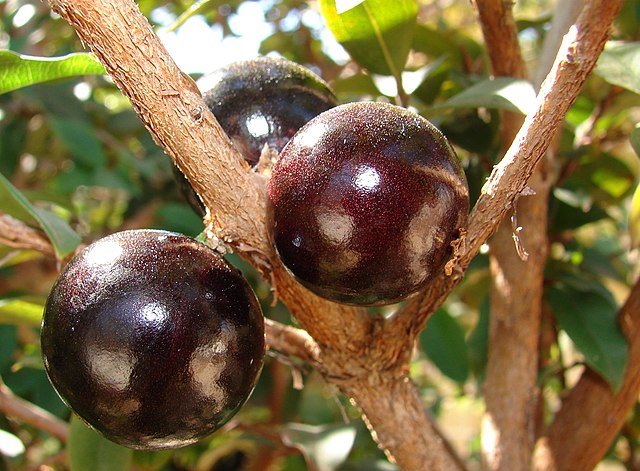

Jaboticaba peel contains beneficial phenolic compounds such as anthocyanins, which give the berry its dark purple color and enhance glucose metabolism (photo: Alexandre Campolina/Wikimedia Commons)
In a study with 49 participants, researchers at the State University of Campinas found that daily consumption of a dietary supplement containing 15 g of the substance for five weeks improved glucose metabolism even after meals.
In a study with 49 participants, researchers at the State University of Campinas found that daily consumption of a dietary supplement containing 15 g of the substance for five weeks improved glucose metabolism even after meals.

Jaboticaba peel contains beneficial phenolic compounds such as anthocyanins, which give the berry its dark purple color and enhance glucose metabolism (photo: Alexandre Campolina/Wikimedia Commons)
By Maria Fernanda Ziegler | Agência FAPESP – The skin or peel of the Jaboticaba berry (Plinia jaboticaba), a native of the Brazilian Atlantic Rainforest, is usually thrown away because of its astringency (due to an abundance of mouth-puckering tannins), yet it can be a powerful ally in the treatment of obesity and metabolic syndrome, according to an article published in the journal Nutrition Research.
Conducted by researchers at the State University of Campinas (UNICAMP) in São Paulo state (Brazil), the study showed that inflammation and blood sugar levels improved in volunteers with obesity and metabolic syndrome who took 15 g per day of powdered jaboticaba peel as a dietary supplement for five weeks.
“The phenolic compounds and dietary fiber present in jaboticaba peel have the power to modulate glucose metabolism. We observed this effect in previous studies. This study focused on the benefits of prolonged consumption and found that the positive effect on blood sugar extends to the period following a meal, i.e. to post-prandial glycemia. Blood sugar typically rises after meals even in healthy people, although it soon returns to normal in these cases. Something that can lower blood sugar levels after meals is interesting because it helps people control this variable over time and live a healthier life,” Mário Roberto Maróstica Junior, last author of the article and a professor at UNICAMP, told Agência FAPESP.
In the study, which was supported by FAPESP via three projects (22/09493-9, 19/12244-8 and 21/02271-8), 49 patients with metabolic syndrome and obesity were divided into two groups, one of which took 15 g of jaboticaba peel powder as a daily supplement for five weeks, while the other took a placebo. Body weight, waist circumference, blood pressure, metabolic and inflammatory parameters such as interleukin-6 (a marker of obesity and systemic inflammation) were assessed at weeks 0 and 5, and blood sugar was regularly measured.
“The main benefits of taking the supplement were lower post-prandial glycemia and less inflammation. Jaboticaba can’t perform miracles, but it’s an excellent way to help control blood sugar. Of course, it needs to be used in conjunction with other measures, such as a healthy diet and physical exercise,” he said.
Bioactive compounds
The phenolic compounds present in jaboticaba peel include anthocyanins, which give the berry its deep purple color and enhance glucose metabolism, above all by stimulating L-intestinal cells. “When these substances reach the intestines, they come into contact with L-cells, which release a compound called GLP-1 [glucagon-like peptide-1], which in turn triggers the release of insulin by the pancreatic cells,” he said.
Insulin released by the pancreas improves the use of glucose. “This is one of the functions of insulin. When it reaches the muscle cells, which are the prime drivers of glucose uptake, insulin triggers a signaling cascade that favors the transport of glucose into the cell,” he said.
Metabolic syndrome is a cluster of metabolic and hormonal alterations that heighten the risk of cardiovascular disease, including high blood pressure and blood sugar, abdominal obesity, and abnormal levels of triglycerides and HDL cholesterol. In the study, the 49 participants with metabolic syndrome exhibited at least three of these five alterations.
Obesity is generally associated with abnormally high levels of pro-inflammatory molecules. “It’s as if the person had constant inflammation. This hinders the action of insulin so that overweight and obese people tend to be insulin-resistant. In these cases, insulin is usually produced but doesn’t work properly,” he said.
The abnormally high level of blood sugar can lead to type 2 diabetes unless it is treated with medication and/or healthy habits and weight loss. “Jaboticaba peel supplement reduces the level of interleukin-6, which plays a key role in the development of insulin resistance and contributes to adipose tissue inflammation. Its positive effect on post-prandial blood sugar and inflammation makes it an ally for treatment of metabolic syndrome,” he said.
No one wants to eat jaboticaba peel as such because of its astringency, he acknowledged, “but this problem can be surmounted by using the commercially available extracts and supplements”.
The article “Jaboticaba peel improves postprandial glucose and inflammation: A randomized controlled trial in adults with metabolic syndrome” is at: www.sciencedirect.com/science/article/abs/pii/S0271531724000277?via%3Dihub.
Republish
The Agency FAPESP licenses news via Creative Commons (CC-BY-NC-ND) so that they can be republished free of charge and in a simple way by other digital or printed vehicles. Agência FAPESP must be credited as the source of the content being republished and the name of the reporter (if any) must be attributed. Using the HMTL button below allows compliance with these rules, detailed in Digital Republishing Policy FAPESP.





